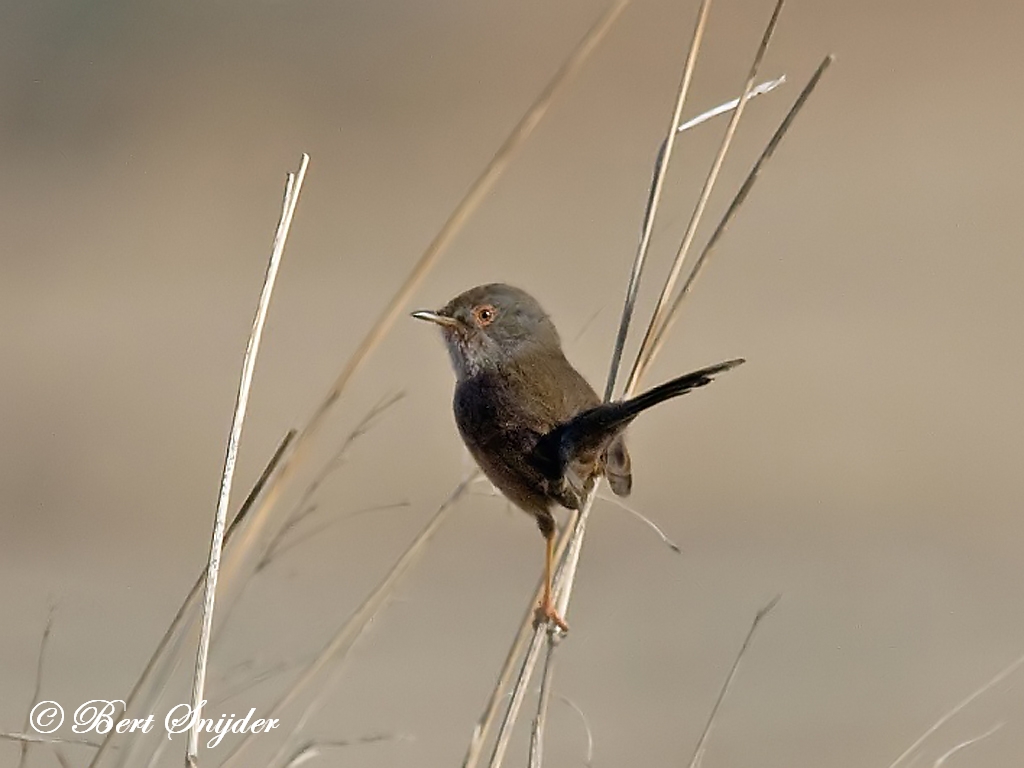Dartford Warbler, Provencaalse Grasmus, Provencegrasmücke, Felosa do Mato, Curruca Rabilarga
Spotted in the Alentejo region of Portugal. Dartford Warbler sound
The Dartford Warbler (Sylvia undata) is a typical warbler from the warmer parts of western Europe and northwestern Africa. Its breeding range lies west of a line from southern England to the heel of Italy (southern Apulia). The Dartford Warbler is usually resident all year in its breeding range, but there is some limited migration.

The Dartford Warbler is a small (13 cm (5.1 in)) passerine bird, distinguished by its long tail compared with that of other warblers. Its plumage comprises unobtrusive and muted tones, which blend in with the dry dead plants, old wood or sunny greyish wood found in its preferred habitats.
Like many typical warblers, the Dartford Warbler has distinct male and female plumages. The male has a grey back and head, reddish underparts, and a red eye. The reddish throat is spotted with white. The sides are a dull greyish tone, being more clear about the abdomen. In some populations males have bluish-grey or brownish-grey backs and heads. The female is paler below, especially on the throat, and a browner grey above. The female’s throat also has white spots, although they are smaller and less marked than in the male. Juvenile birds are similar to females.
The species is naturally rare. The largest European populations of Sylvia undata are in the Iberian peninsula, others in much of France in Italy and southern England. In Africa it can be found only in small areas in the north, wintering in northern Morocco and northern Algeria.
This small warbler breeds in heathlands, sometimes near coasts, with gorse bushes for nesting. Like its relatives, the Dartford Warbler is insectivorous, but will also take berries. The nest is built in low shrub, and 3–6 eggs are laid. It inhabits open fields with degraded scrub brush and is common in heather. In winter it may visit urban areas, but always finds shrubs in these areas. Nests in bushes with thorns and near the ground. These warblers are mostly insectivore, feeding caterpillars, butterfliess, beetles and spiders. The song of the Dartford Warbler is a distinctive rattling warble.
Dartford Warblers are named for Dartford Heath in north west Kent, where the population became extinct in the early 20th century. They almost died out in the United Kingdom in the severe winter of 1962/1963 when the national population dropped to just 10 pairs. However, this species can recover well in good quality habitat, thanks to repeated nesting and a high survival rate for the young. Indeed they recovered in some areas of the UK, but numbers are once again on the decline in other regions of that country, as well as elsewhere.
Formerly classified as a ‘Species of Least Concern’ by the IUCN, it was suspected to be rarer than generally assumed. Following the investigation of the apparent decline this was confirmed, and the Dartford Warbler was consequently relisted to Near Threatened status in 2008.
Other synonyms:
Asturian: Cotoyina
Breton: An devedig bruched ruz
Catalan: Busqueret roig, Tallareta cuallarga
Catalan (Balears): Busqueret roig
Czech: Penice kaštanová
Welsh: Telor Dartford, Telor yr eithin
Danish: Provencesanger
German: Provencegrasmücke
English: Dartford Warbler, Dratford warbler
Spanish: Corruca de Cola Larga, Curruca Rabilarga, Zarcero común
Estonian: nõmme-põõsalind
Basque: Etze-txinboa, Tallareta cuallarga
Finnish: Ruskokerttu
French: Fauvette pitchou
Irish: Ceolaire Fraoigh
Galician: Papuxa do mato, Tallareta cuallarga
Hungarian: Bujkáló poszáta
Icelandic: Busksöngvari
Italian: Magnanina
Japanese: onagamushikui
Latin: Sylvia undata
Dutch: Provencaalse Grasmus, Provençaalse Grasmus
Norwegian: Provencesanger, Vinsanger
Polish: pokrzewka kasztanowata, Pokrzewka kusztanowata
Portuguese: felosa do mato, Felosa-do-mato
Romansh: Fustgetta da la Provence
Slovak: Penica gaštanová, penica hnedá
Slovenian: palcja penica
Albanian: Bilbilthi i shpinëmurrmë
Swedish: Provencesångare
Travel Birdwatching Holiday Alentejo, Vacation Portugal for birders guided birdwatching Tours and Trips.